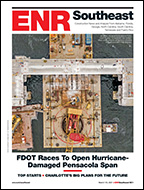
Caltrans has begun a long-term repair of the failed eyebar on the San Francisco-Oakland Bay Bridge that was discovered during the Labor Day closure.
According to Caltrans spokesman Bart Ney, work on the eyebar will not require a full bridge closure; instead, crews will work overnight, which will require three lanes to close on the upper deck and one lane on the lower deck. The repair and related lane closures will last approximately three weeks, with an additional five weeks possibly needed at a later date.
“We would like to thank motorists in advance for their patience during the upcoming lane closures,” says Caltrans Director Randell Iwasaki. “This is the right fix and a long-term one that should keep the 73-year old bridge safer until it is replaced.”
The affected lanes will be the three-left most lanes on the upper deck and the far right lane on the bottom deck. These lanes will be closed no earlier than 12 a.m. and will reopen no later than 8 a.m. on weekends.
On weekdays, the upper deck lanes will be closed no earlier than 10 p.m. and will reopen no later than 5 a.m.; the lower deck lane will close no earlier than 10 p.m. and will reopen no later than 7 a.m. This schedule will ensure that all lanes will be open during peak traffic hours.
During the repairs, all transbay bus service will run as scheduled, and all on-and off-ramps will not be impacted. BART will not provide overnight service during the lane closures.
Ney says the design of the long-term repair was done by Caltrans, with input and assistance from independent experts and the contractor, American Bridge-Fluor (A Joint Venture), which is the primary contractor building the self-anchored suspension span on the new Bay Bridge and has a significant amount of experience in steel bridge erection and repair, including the repair of eyebars.
The repair will entail cutting and removing approximately 12 feet of the cracked eyebar, and replacing the removed section with new structural steel that will be spliced onto the remainder of the existing eyebar. This may be supplemented with additional structural steel at a later date.
According to Caltrans, a panel comprised of Frieder Seible, Dean of Jacobs School of Engineering at the University of California at San Diego, member of the Toll Bridge Program's Seismic Safety Peer Review Panel and former Adjunct Professor of Engineering at Columbia University; and Ahmad Itani, professor in the Department of Civil and Environmental Engineering at the University of Nevada at Reno provided input and advice during the development of the short-term repair. Caltrans has supplemented this panel on the long-term repair with the addition of FHWA Chief Bridge Engineer, Myint Lwin. This Blue Ribbon Panel continues to provide invaluable expertise, input and advice.



